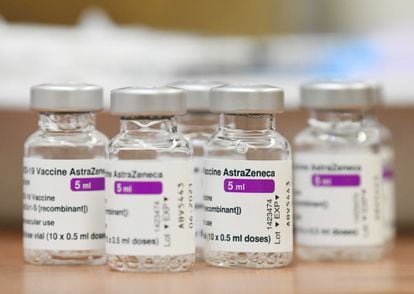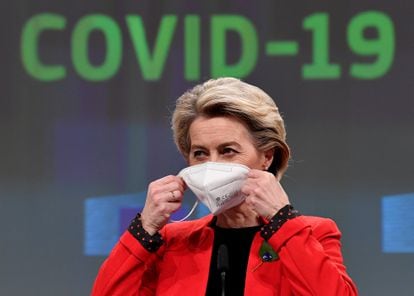AstraZeneca fiasco undermines EU strategy to beat coronavirus health and economic crisis
Brussels was hoping to distribute 160 million Covid-19 vaccines by all makers during the first quarter, but so far it has only handed out 70 million compared with 154 million in the US
/cloudfront-eu-central-1.images.arcpublishing.com/prisa/HYCTCCOMJZFFJMNL4FYHVTQRT4.jpg)
Reiterated holdups in the distribution of the Covid-19 vaccine developed by Oxford-AstraZeneca, coupled with the recent scare over its side effects, have dangerous ramifications for Europe that go beyond a delayed appointment for a vaccine shot.
The fiasco involving a vaccine that was meant to power the bulk of the continent’s inoculation campaign could damage the EU’s strategy to overcome the coronavirus health and economic crisis on the continent. This strategy is based on a swift mass-vaccination drive in order to return to near-normal mobility by June and breathe back some life into the struggling services sector.
But governments are getting skittish after initially raising people’s hopes of a quick return to normalcy once vaccination got underway, only to run into a reality that is proving tougher to turn around than expected.
A make-or-break month
Following the problems with the vaccine rollout in the first quarter of the year, combined with new infection spikes across the continent, all of the European Commission’s health and economic targets are now up in the air.
“It’s going to be make-or-break for the European Commission during the four weeks of April,” warns Nicolás González Casares, a Member of the European Parliament (MEP) with the Group of the Progressive Alliance of Socialists and Democrats who also sits on the parliament’s Industry, Research and Energy Committee monitoring the vaccination strategy.
“If the dose distribution speed does not pick up at the beginning of the second quarter, the EU Commission will face an explosive political situation, with a rising wave of infections, a population that is increasingly weary of restrictions and governments that will blame Brussels for the mess,” he predicts.
The EU Health Commissioner, Stella Kyriakides, admits to being disappointed with the Anglo-Swedish lab. “With AstraZeneca, there’s been constant problems,” she said on Wednesday at a meeting with the media. “With Pfizer-BioNTech, instead, we had trouble at first but then they managed to increase their production capacity and they have been much more reliable.”
The tension can be felt in Brussels, and the first cracks in the common strategy are already apparent. Austria, which had originally favored AstraZeneca and bought very few vaccines from Pfizer-BioNTech, is now leading a request by several central and Eastern European countries to “correct” alleged inequalities in the distribution of doses among the 27 member states. Other members are rejecting the idea.
The clash over fair vaccine distribution could sour a European summit due to take place on Thursday and Friday of this week. The formal goal of the gathering is to rethink the EU’s geostrategic future, particularly with regard to Russia and Turkey. But diplomatic sources admit that it could instead turn into a crisis meeting to try to save national vaccination campaigns.
Slow rollout

Brussels was expecting to distribute around 160 million doses during the first three months of 2021, enough to give 22% of the adult population their two shots. It was also expecting to receive as many as 380 million doses during the second quarter, allowing health authorities to increase the immunized population to over 60% of the total.
In combination with eased restrictions, this would have given the economy an initial boost during the first quarter and really put it into gear during the second. The first-quarter goals have already been abandoned.
The dream of a speedy recovery is vanishing, and the EU is reaching the end of March with fewer than 70 million doses distributed (compared with 154 million in the United States) and only 4.2% of the population fully immunized with both shots.
AstraZeneca is now planning to deliver 100 million doses during the first half of the year, that is to say, 170 million fewer than it had pledged. This means that 85 million people will go without their double-dose treatment.
Meanwhile, the continent is experiencing a new spike in infections and several major countries are reintroducing confinement measures, including France and Italy. In the former, 21 million people – a third of the population – will be under restrictions for at least four weeks. Around 110,000 retail establishments are being forced to close, half of them in the Paris region, according to French government figures.
Health concerns
Compounding the problems is the shadow of suspicion cast over the AstraZeneca vaccine in recent weeks, when half of the EU’s members – Spain included – decided to suspend its use and wait for a conclusion by the European Medicines Agency following several reports of blood clots among recipients. The regulator ultimately said that the medication is “safe and effective” although it admitted that “the vaccine may be associated with very rare cases of blood clots associated with low levels of blood platelets.” Even so, “the benefits of the vaccine in combating the still widespread threat of Covid-19 (which itself results in clotting problems and may be fatal) continue to outweigh the risk of side effects.”
Germany, France and Italy started to distribute the vaccine again at the end of last week, and political leaders such as Angela Merkel said they would receive AstraZeneca shots. But it is unclear whether confidence in the vaccine can be restored. In France, only 20% of the population trusts the AstraZeneca vaccine compared with 52% who trust Pfizer-BioNTech, according to a survey for the TV station BFMTV.
Political fallout

At the political level, the EU Parliament is starting to lose patience with its own executive, and could start asking for accountability if the vaccination campaign derails in the second quarter of the year.
“The Commission asked to lead the vaccination strategy without having the powers to do so, and once member states agreed to hand over this power, it has proven incapable of organizing [the campaign],” says an EU source familiar with the situation.
Faced with the risk of having her own leadership questioned, EU Commission President Ursula von der Leyen has begun adopting a tougher tone against the United Kingdom, where AstraZeneca factories have yet to produce a single dose for delivery to the EU. Von der Leyen on Wednesday warned that nothing is being ruled out, not even a ban on vaccine exports from the EU to Britain, which has already received 10 million doses from the continent (mostly from Pfizer-BioNTech), while none have made the opposite journey.
Véronique Trillet-Lenoir, a French MEP with the liberal group Renew and member of the Health and Environment Committee, says that the time has come for the EU to “show its teeth” to AstraZeneca and, by extension, to the UK. In her opinion, the confrontation with this company will require a two-pronged solution: a contractual one that could end up in the courts, and a diplomatic one with the British government. “But experience with Brexit indicates that it will not be easy.”
English version by Susana Urra.
More information
/cloudfront-eu-central-1.images.arcpublishing.com/prisa/6EOUYTTUJ7XBUFXPWNU7ORKAYI.jpg)
/cloudfront-eu-central-1.images.arcpublishing.com/prisa/IJNAOWHUA2ZL5PPQFEHUWHFDNQ.jpg)










































